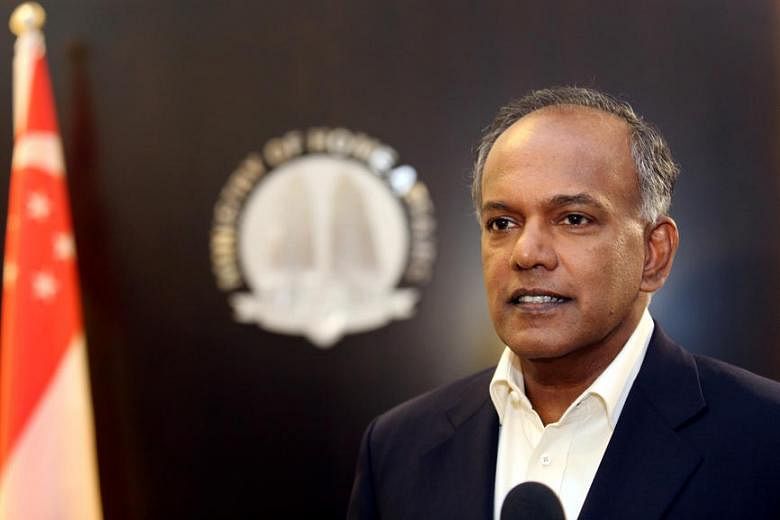Individuals who preach extremism and influence others to commit violence are more dangerous than those who seek to inflict physical harm on others, Home Affairs Minister K. Shanmugam said yesterday.
Calling these ideologues' actions a "dangerous, pernicious influence", he said Zulfikar Mohamad Shariff, who was detained this month for terrorism-related activities, sought to turn ordinary Singaporeans into terrorists. "He really wanted to brainwash Muslims in Singapore to reject the democratic nation state and instead have an Islamic caliphate," Mr Shanmugam told reporters following the announcement of the arrests under the Internal Security Act (ISA) yesterday.
Zulfikar, 44, radicalised two Singaporeans: security guard Muhammad Shamin Mohamed Sidek, 29, who was detained last July, and businessman Mohamad Saiddhin Abdullah, 33, who was issued a Restriction Order this month.
Mr Shanmugam's comments were underscored by Deputy Prime Minister Teo Chee Hean, who said in a Facebook post that the Government will take firm action against anyone who agitates to divide Singaporeans or sow conflict here through religious extremism.
Mr Shanmugam, who is also the Law Minister, said there is a clear difference between advocating a cause through social activism and glorifying terrorism under the cover of religious freedom and freedom of speech.
Zulfikar, who migrated to Australia with his family in 2002, had made several postings on social media supporting the actions of the Islamic State in Iraq and Syria (ISIS).

"Radicalising people, recruiting people to go and fight overseas, glorifying ISIS and taking steps to say there should be an Islamic caliphate in Singapore - that, for us, crosses the line," Mr Shanmugam said. He disclosed that the authorities had been watching Zulfikar for some time to gather evidence. They could not act earlier because he was overseas. He was arrested when he came to Singapore this month.
The minister pointed out that Zulfikar had no qualms about collecting unemployment benefits in Australia. "He apparently was on the dole there, so he was getting money from the Australian taxpayer while criticising the democratic, secular system which was feeding him."
He also noted that a 17-year-old male put on a Restriction Order this month is the first madrasah-educated person to be arrested for terrorism-related activities.
The youth became radicalised after accessing online pro-ISIS videos, websites and social media posts.
Mr Shanmugam stressed that people should not have the impression that there is a problem with madrasahs or the Muslim community.
"The mainstream of our Muslim community and... of our madrasah community are Singaporeans. They believe in the ideals of Singapore, just like our Chinese Singaporeans, Indian Singaporeans," he said.
What needs a closer watch, he added, is the extremist influences and teachings sweeping the region. He was sanguine about Singapore's approach in detaining radicalised individuals. Of the 81 detained since the Sept 11, 2001 attacks on the United States, two have relapsed.
One of them is Muhammad Fadil Abdul Hamid, 27, who was detained in April for wanting to join a terror group like ISIS. He had been detained in 2010 but was released on a Restriction Order in 2012.
Said Mr Shanmugam: "When you rehabilitate and you release, obviously you're taking a risk... you hope they go on to lead meaningful lives but you must understand that there could be relapses."


